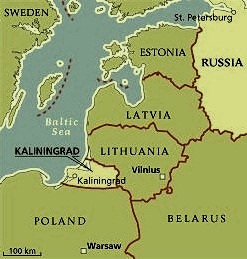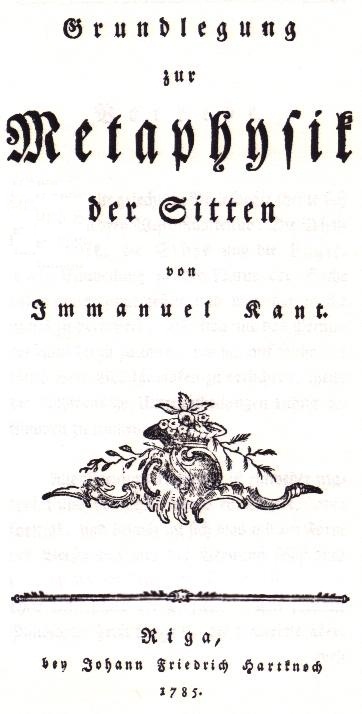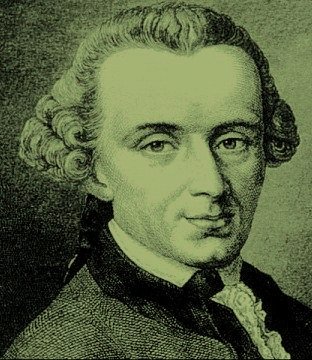Kant’s Groundwork continues to be translated into English, and English-language
commentaries continue to roll steadily off the presses. That’s somewhat astounding, considering that this
little book was published in German years ago, by a man who, they say, could not read English.
Kant was born in Königsberg, East Prussia, in 1724. He died there in
1804. He never married; and it is said that he never left his home town; or if he did, he did not travel far, often, or
for very long. He was educated as a philosopher in the German tradition of Gottfried Leibniz and Christian Wolff; but
he eventually broke away. He famously credited the Scottish skeptic, David Hume, for waking him from “dogmatic
slumbers.” His contributions to philosophy were fresh, and bold, even if he inescapably carried some of
the baggage of his early education. As a young philosopher he lectured privately to support himself, for too many years.
His break finally came, in 1770, when he was appointed professor of logic and metaphysics at the local university:
Königliche Albertus-Universität (or, “the Albertina”—Albert was the first King
of Purssia). After a “decade of silence” Kant came out with
his monumental
Critique of Pure Reason, in 1781.
There is not much to be found in the way of ethics in that Critique,
although it does provide a novel solution to the problem of freedom of the will.
Kant’s first work dedicated solely to ethics
was the Groundwork (1785). It would be followed by two more books on ethics: Critique of Practical Reason (1788),
and The Metaphysics of Morals (1797).


Kant’s Königsberg is today called Kaliningrad. It is in a satellite district of
Russia, the Russian word for which is “oblast.” Kaliningrad Oblast is located on the Baltic Sea
north of Poland, and separated from the mother land by Lithuania and Latvia.
The former Royal University of Königsberg (the Albertina) now bears the name:
Immanuel Kant Baltic Federal
University. It is the only university named for a modern philosopher.

This website is yet another commentary on the Groundwork. But it does
not aim to comment on everything in the text. The primary focus will be on the main arguments and theses, which are
often disputed. The idea for this came to me recently while refereeing a new commentary
prior to publication, for a major press. The author seemed to want to comment on every line
of the Groundwork, at least at the
beginning. I recommended instead that he streamline the whole book, stressing only the more controversial arguments.
But I see from the published book that my recommendation was ignored. So, still thinking it was a good idea, I
determined to do it myself.
As a teacher of ethics I am sometimes dismayed at the misconceptions about Kantian ethics
conveyed to students in introductory textbooks. Writing for students at this level needs to be simplified,
of course. But it should also be accurate. I don’t know how many times I’ve read how Kant
said that in order to do our duty we must act with a good will. I don’t know how many times I’ve read that
principles of Kantian duty permit no exceptions—even though there is a whole class of duties (imperfect) that are
defined as admitting exceptions. One of the most effective ways to cultivate philosophical understanding in beginning
students is to present a theory and then list the major criticisms that have arisen since it was popularized.
It helps students to understand the criticisms, also, if the theory is caracitured at the start.
But the problem is that
some of those students grow up to be philosophy teachers, and have difficulty shaking off the collection of
errors first presented to them. These teachers then pass along their
distorted conceptions of the theory, and then on it goes, for generations.
This commentary is pitched for somewhat advanced students of ethics, who might
someday be writers of
introductory textbooks. Its goal, as with almost any commentary, is to present an informative and sympathetic portrayal
of its object-text that is, above all, easier to understand. Fortunately that last part is not so difficult,
considering how hard it can be for comtemporary readers to understand Kant’s writing.
Next: About the Groundwork
©
Richard McCarty
Department of Philosophy & Religious Studies
East Carolina University
USA
Last modified: January 4, 2018
Terms of use. Access to this copyrighted electronic document is open to everyone.
Permission is hereby granted to quote any parts under 500 words, provided the author’s
name is cited, along with the names and sources of any other authors quoted. Permission is
also granted to quote any parts under 500 words in translation, provided the author’s
name is cited, along with the names and sources of any other authors quoted. Duplicating
this copyrighted material without obtaining prior, written permission is allowed only for
local instructional use (“fair use”), which must include this statement of terms
of use. Plagiarism is not allowed. Your professor can find this resource as easily as you
did.




